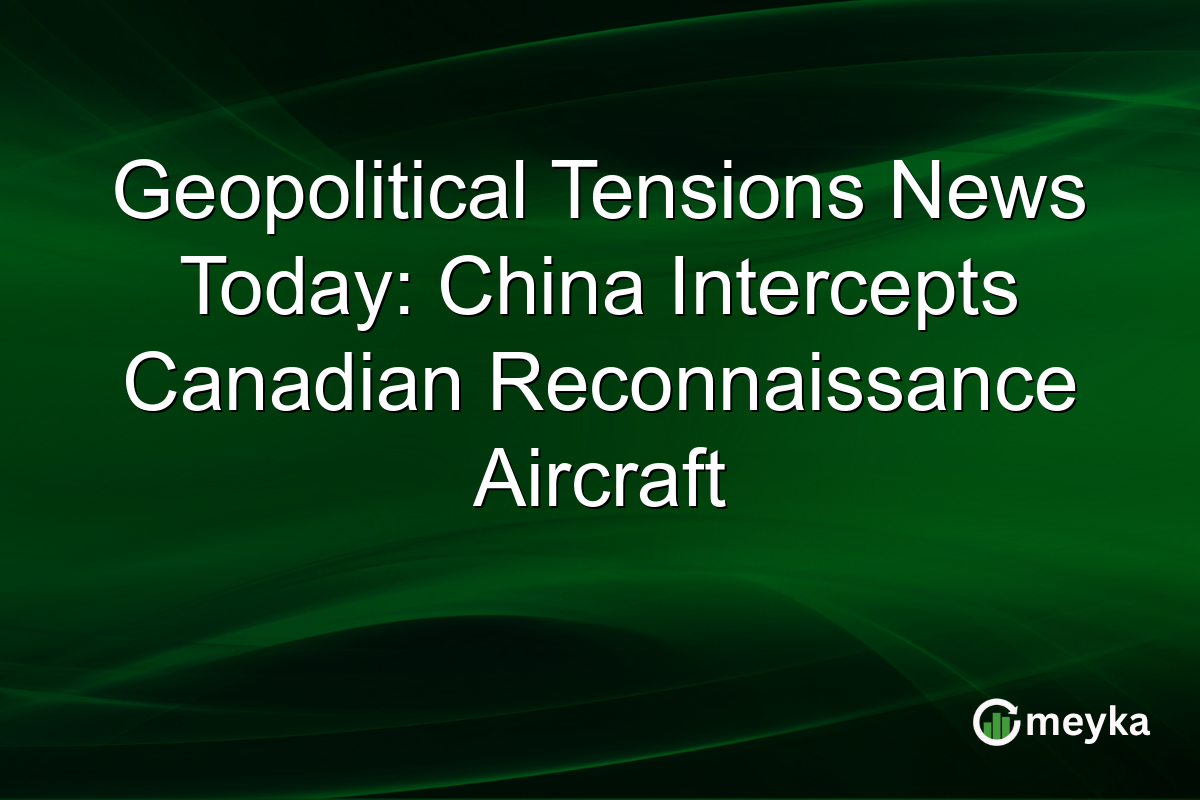Geopolitical Tensions News Today: China Intercepts Canadian Reconnaissance Aircraft
Tensions have escalated as China intercepts a Canadian reconnaissance aircraft near the contested South China Sea. This incident has drawn significant attention, highlighting increasing geopolitical frictions between China and Canada. It also underscores the broader implications for regional security dynamics, particularly involving US-China military tensions. This interception emphasizes critical issues surrounding freedom of navigation and military strategies in this sensitive area.
China Intercepts Canadian Aircraft Near South China Sea
The incident occurred on October 5, 2025, when a Chinese fighter jet intercepted a Canadian CP-140 Aurora aircraft. The plane was reportedly conducting surveillance missions over international waters. However, China claims that the activities posed a threat to its national security. This activity unfolds amid ongoing disputes over the South China Sea, where several countries, including the US and China, assert competing maritime claims.
International law generally upholds the freedom of navigation through international waters. Yet, the interception suggests an aggressive stance by China’s military, raising concerns over the potential for miscalculation or conflict. This situation further illuminates the precarious balance of power and the fragile peace maintained in the region.
Impact on US-China Military Tensions
The South China Sea incident exacerbates existing US-China military tensions. The region has been a flashpoint for years, with China’s increasing military presence causing unease among Western nations. The US, which champions freedom of navigation, often conducts naval operations in defiance of China’s territorial claims.
The interception of a Canadian plane by China only adds fuel to these tensions. It could potentially lead to a more assertive stance from the US and its allies. There’s a risk that such interactions might escalate into broader confrontations, affecting global peace and stability. This incident underscores the delicate balance of military power and the risk of conflicts arising from miscommunication or misinterpretation.
Canadian Defense Response and Regional Tensions
Canada has expressed its concern over China’s actions, deeming them unsafe and unprofessional. Canadian officials have sought immediate explanations from Chinese counterparts, emphasizing the importance of respecting international law. This response aligns with Canada’s commitment to ensuring regional security and its role within international alliances.
The interception is a stark reminder of the complex geopolitical dynamics at play in the Indo-Pacific region. It can potentially affect Canada’s military strategies and diplomatic relations not only with China but also with other countries in the area. Strategies might be revised to ensure that reconnaissance flights continue without provoking further incidents.
Potential Regulatory and Diplomatic Impacts
The geopolitical situation could lead to regulatory scrutiny. Countries may reassess their military engagement rules in contested territories. Diplomatic relations between China and Western nations might face strain, further complicating global political and economic dynamics.
The incident might also influence market stability, with investors staying alert to any developments that could affect international trade routes or military engagements. Countries involved may reinforce alliances and cooperation to counterbalance China’s regional influence.
Final Thoughts
In conclusion, China’s interception of a Canadian reconnaissance aircraft near the South China Sea is a significant event with broad implications. It not only tightens the geopolitical landscape between China and Canada but also highlights the fragile dynamics of US-China military tensions. The incident underscores the crucial need for adherence to international laws to ensure regional stability. As countries navigate these turbulent waters, maintaining clear communication and diplomatic dialogue is critical to averting conflicts and preserving international peace.
FAQs
China intercepted a Canadian reconnaissance aircraft near the South China Sea, claiming it posed a security threat. Canada contested this, calling it unsafe and unprofessional.
US-China military tensions involve disputes over the South China Sea, with the US challenging China’s territorial claims to uphold freedom of navigation and maintain regional balance.
Canada called the interception unsafe and has demanded explanations from China, asserting the encounter was unprofessional and dangerous in international airspace.
Disclaimer:
This is for information only, not financial advice. Always do your research.






